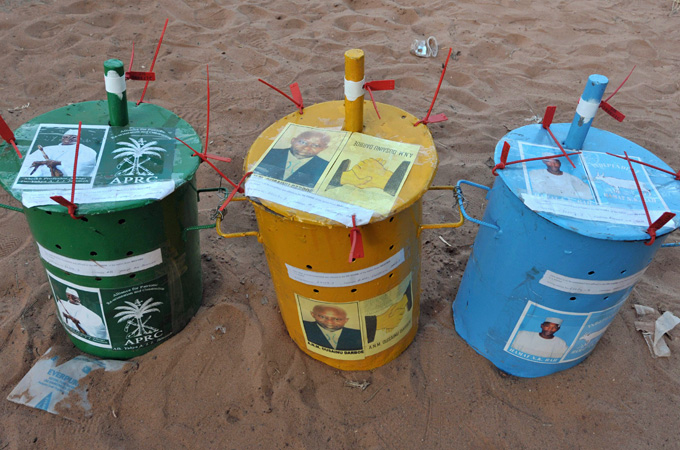Gambia’s Jammeh wins disputed elections
Incumbent president in power for 17 years set to begin new five-year term after polls marred by intimidation of voters.

 |
| Voters dropped marbles into containers marked with the contestant’s names [AFP] |
Gambia’s election commission has declared incumbent President Yahya Jammeh winner of Thursday’s elections, paving the way for him to begin a new five-year term in the West African country.
Jammeh, who has been in power for 17 years, scored a landslide 72 per cent victory, according to results read out on Friday by Alhagie Mustapha Carayol, the chairman of the Independent Electoral Commission.
The vote was regionally criticised as it was marred by intimidation of voters and the opposition.
Early results had shown the main opposition leader, Ousainou Darboe, trailing with just 14.5 per cent of the vote while independent candidate Amath Bah had polled 8.3 per cent.
Nearly 800,000 voters were registered in a system under which they were given one marble each to be dropped into a drum corresponding to the candidate of their choice. The marble strikes a bell inside the drum, preventing multiple voting.
“I am confident to win with a landslide majority,” Jammeh had told reporters as he voted in the capital Banjul.
“People know what I did for the Gambia for the past 17 years in terms of development. The British who were here for 400 years never did that,” he said of Gambia’s former colonial ruler.
Jammeh, one of Africa’s most controversial rulers, first took power at the age of 29 after a 1994 army coup.
He declared in July that neither a vote nor a coup could oust him, saying he ruled thanks to divine intervention.
‘Repression and intimidation’
Observers from the African Union, Commonwealth and European Union were monitoring the vote.
Regional body ECOWAS decided not to send a mission, saying its fact-finding mission had found “an unacceptable level of control of the electronic media by the party in power … and an opposition and electorate cowed by repression and intimidation”.
Many voters turned up on Thursday only to be told they were at the wrong polling station.
“It is really discouraging. People are finding it difficult to know the place where they are supposed to vote,” One Isatou Njie, a homemaker in Gambia’s capital, said.
Jammeh has courted controversy with reported threats to human rights groups and a 2008 order for all homosexuals to leave Gambia.
In 2007, he announced he had a herbal concoction that cured AIDS, but only on Thursdays, a claim derided by international health experts.
In 2009, his administration rounded up nearly 1,000 people accused of being witches and forced them to drink an unidentified liquid. Some developed serious kidney problems and two people died, according to rights group Amnesty
International.
Supporters credit Jammeh with improving infrastructure across the country, best known as a beach holiday destination for Europeans.
However, poverty is crippling the nation where many workers have an income of around $1 a day.